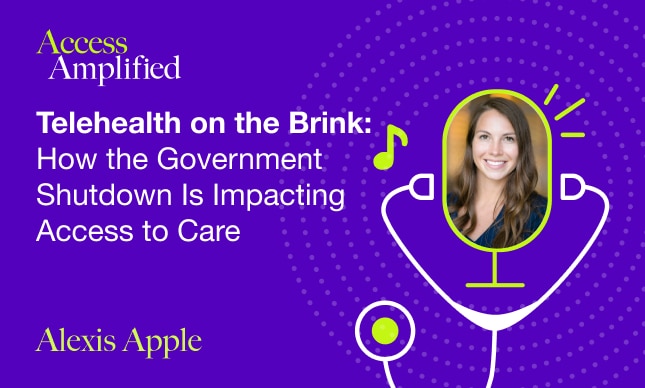Telehealth on the Brink: How the Government Shutdown Is Impacting Access to Care

As the U.S. government shutdown stretches into its fourth week, millions of Americans are feeling its ripple effects, especially when it comes to healthcare access. In this special edition of Access Amplified, Joanna Braunold sits down with Alexis Apple, Director of Federal Affairs at the American Telemedicine Association, to unpack what’s happening behind the scenes. From Medicare telehealth flexibilities lapsing to hospitals pausing virtual visits, Alexis offers an insider’s view of how the shutdown is reshaping care delivery, and what advocacy efforts are underway to protect access for patients across the country.
Watch the live recording
When the U.S. government shut down in early October 2025, most Americans thought of it as a political standoff. But for patients relying on telehealth, the consequences were immediate. Medicare’s pandemic-era flexibilities, which had enabled millions of people to receive care virtually, suddenly lapsed, and for the first time in five years reimbursement stopped for most telehealth visits outside designated rural clinics.
Key Insights:
Alexis Apple explains how this abrupt change has left providers in limbo. Many are continuing to deliver virtual care, hoping Congress will reinstate coverage and reimburse them retroactively, but smaller systems can’t sustain the risk. Roughly a third of ATA’s member organizations have already suspended telehealth services, while another third are preparing to follow if the shutdown drags on.
The impact is especially sharp for seniors, rural residents, and patients with mobility barriers — groups for whom telehealth isn’t just convenient but essential. With advanced beneficiary notices shifting financial liability to patients, many are choosing to cancel visits altogether.
ATA’s Response:
Apple outlines how the American Telemedicine Association and its advocacy arm, ATA Action, are leading the charge on Capitol Hill by engaging with Congress, CMS, and the White House to push for immediate reinstatement of telehealth flexibilities. The ATA is equipping its 450 members with policy guidance, real-time intelligence, and advocacy tools to make sure telehealth “doesn’t get lost in the conversation” amid competing federal priorities.
Takeaways:
Apple’s message is clear: telehealth is essential, and it’s here to stay. The shutdown has underscored both the strength and fragility of virtual care – revealing how deeply telehealth is embedded in U.S. healthcare, yet how vulnerable it remains to policy uncertainty. To build true resilience, she argues, permanent legislative frameworks and equitable infrastructure, including broadband access, are critical.
Meet Alexis Apple
Alexis Apple is the Director of Federal Affairs at the American Telemedicine Association (ATA), and Senior Manager, Federal Government Relations at ATA Action, the ATA’s affiliated trade association focused on advocacy, working with and on behalf of ATA and ATA Action members and like-minded organizations to eliminate barriers to the expansion of telehealth and ensure patients, providers, and payers can realize the benefits of virtual care. Alexis has been with the ATA and ATA Action for over four years now in various policy roles. Prior to the ATA, Alexis worked for a small lobbying firm in Washington, D.C., to advance education and international relation policies and legislation.





